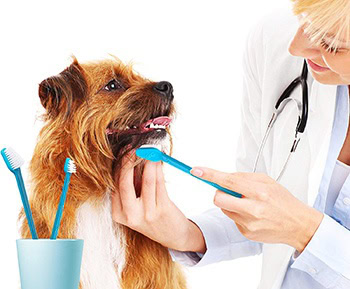Why Do Dogs Bite? 8 Reasons & How to Stop It
By Jordyn Alger
Updated on
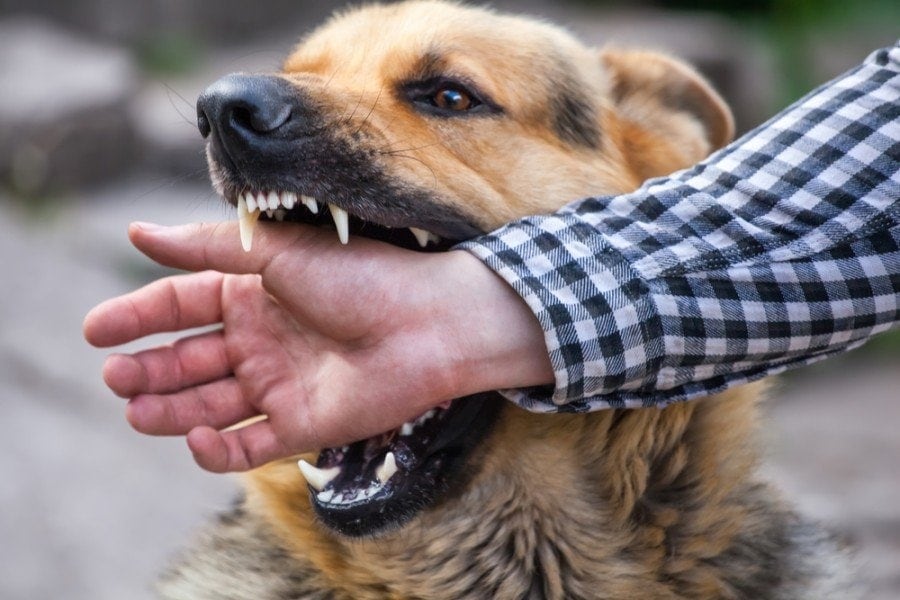
It’s concerning when your precious canine bites you. An occasional nip is usually nothing to be concerned about, but when it becomes a habit, you may have a behavioral problem on your hands. To reduce this behavior, you must first understand what is causing it. When you better understand the cause of your dog’s behavior, you can set him up for success in eliminating his biting habit. In this article, we’ll examine 8 reasons your dog may bite and how to stop it.
The 8 Reasons the Dogs May Bite
1. Fear
Fear is one of the most common reasons for aggressive behaviors (such as biting) in dogs. When dogs enter a state of fear, they can quickly become overwhelmed. If the fear persists or even grows worse, your dog may lash out as a result. This type of aggressive behavior is typically known as defensive aggression, as your dog is not seeking conflict but rather attempting to defend himself from a perceived threat.
If your dog is biting due to fear, determining the source of his fear will help you remove that stressor from his environment. Removing his stressor should reduce his fear, thus reducing his compulsion to bite.
2. Reactive Instinct
Have you ever been so startled by something that you swung your hand out to defend yourself? Your dog has that same impulse when surprised. If someone sneaks up on your dog or grabs him when he is not expecting it, he may instinctively bite without thinking about it. If this happens as a one-time occurrence, you likely have nothing to worry about (as long as no one is injured). I
If you find that this happens frequently, either your dog is biting for another reason, or there is a reason that he is getting surprised so often. You may want to have your dog checked for hearing loss to see if that is why he is surprised by people so often.
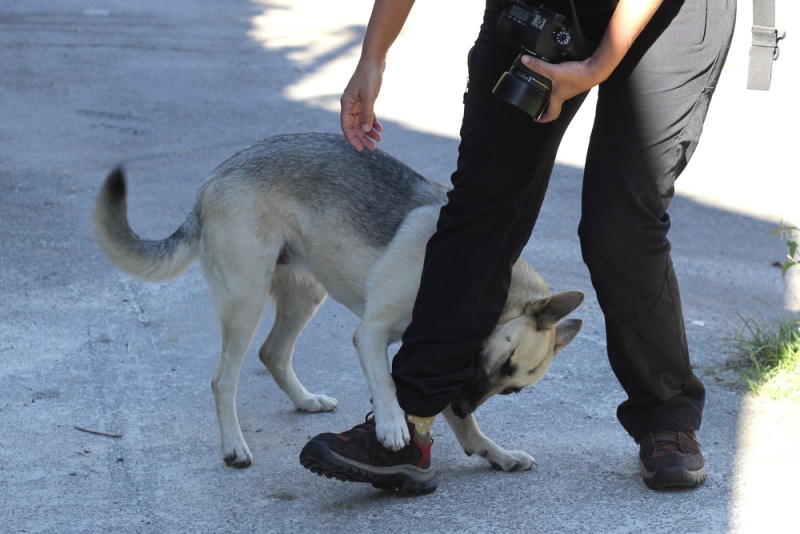
3. Protective Tendencies
Another reason that your dog may bite is due to protectiveness. He may feel this protectiveness for you, another family member, or his personal items (food bowls or toys). This is a bit more common in breeds with strong guarding tendencies since they were bred to be protective.
To stop this behavior, determine what your dog feels protective of. For instance, if you’ve just introduced a new puppy to the home, your dog may feel overly protective of your attention or his food or toys. Once you discover the cause, you can begin to take steps to help him feel less threatened.
4. Overwhelmed Emotions
Overwhelming emotions can be a difficult thing for your dog to navigate. While humans can process their emotions by talking them out or venting to a friend, dogs do not share that luxury. Therefore, when emotions spike and your dog has no outlet to release them, he can quickly become agitated and bite if the emotions continue to rise. These emotions can be distress, frustration, protectiveness, or any emotion where your dog may feel helpless.
To prevent this type of biting, you must pinpoint the cause of your dog’s emotions. If your dog becomes agitated around a specific person, animal, or situation, it is best to avoid those triggers when possible. Understanding the canine’s body language is vital so you can remove your dog from a tense situation before his emotions get out of hand.
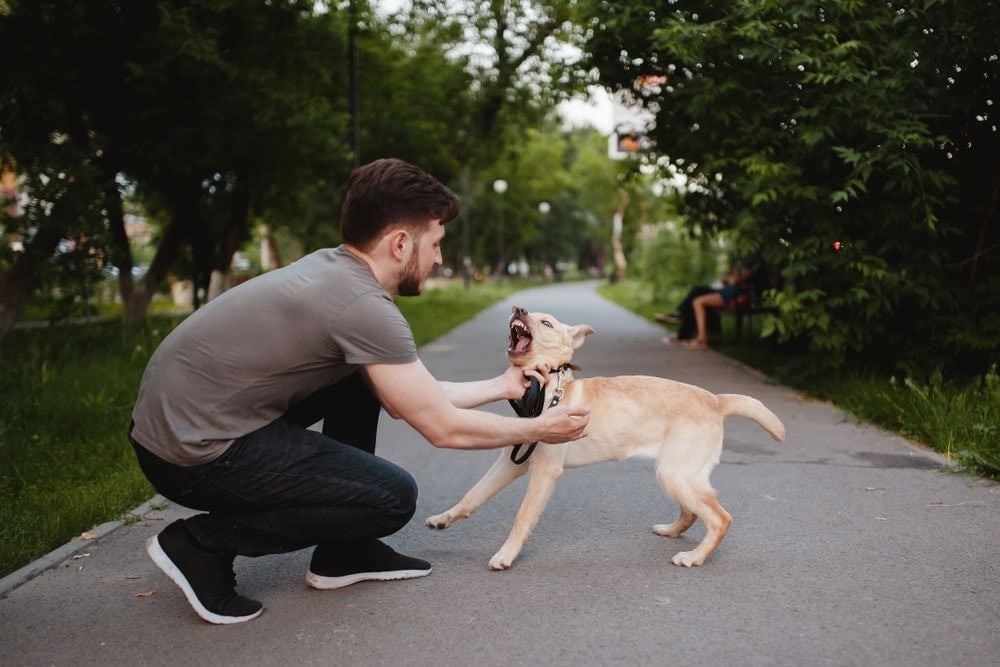
5. Pain or Illness
When your dog is sick or injured, he can quickly become distressed. This anxiety can become so overwhelming that he may bite, especially if you try to touch an area where he is particularly sensitive.
It can be hard to tell when your pet is sick or in pain because dogs mask their discomfort. However, there tend to be some common signs that you can watch for. Physical signs to pay attention to include:
- Tightness of the muscles
- Shaking, trembling, or twitching
- Panting
- Holding his head beneath his shoulders
- Arching his back
There are also some behavioral signs that you can watch out for, such as biting. These include:
- Frequent vocalization
- Restlessness
- Disrupted sleeping habits
- Reluctance to be touched
- Constant licking
- Aggressive behaviors
6. Play
Is your dog biting, or is it more like a nip? Sometimes, dogs nip as a form of play. This is especially common in puppies, who still need to learn boundaries and appropriate behavior.
To determine whether or not this is the reason your dog bites, take note of when he bites most often. If it occurs just before, during, or after playtime, that indicates that he is biting as a form of play. This behavior can be put to rest with training to instill proper playing behaviors.
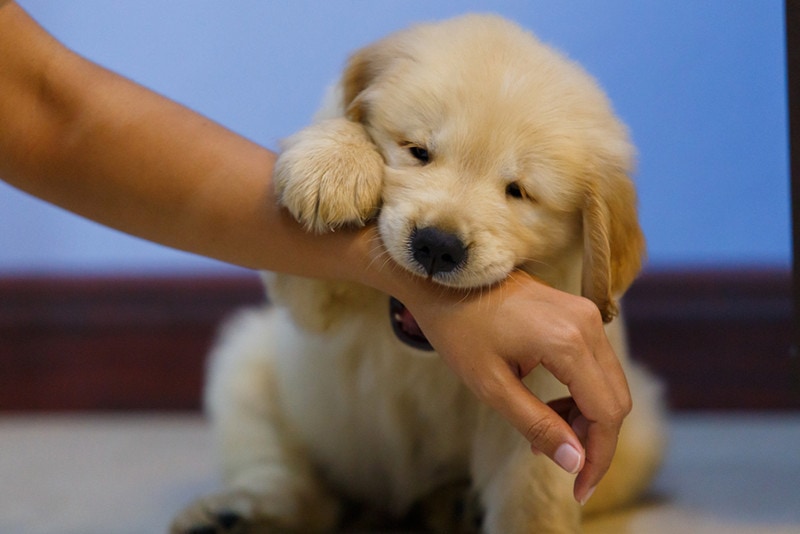
7. Puppy Teething
If you have a young biting puppy, it is possible that his biting is due to teething pains. Teething occurs in puppies around 12 or 16 weeks of age. You may notice your puppy chewing on objects more than usual during this time.
If your puppy is going through the teething stage, there are some ways you can help. First, you can provide teething toys to your puppy so he has something substantial to chew on. You should also supervise him during this period, as his chewing behavior may put him at a higher risk of swallowing something he shouldn’t.
8. Curiosity
Dogs are curious creatures, and that is especially true if they are still young. It is not uncommon to see a puppy chewing on something due to curiosity, and your shoes, pillows, or even fingers may fall victim to this exploration. If your dog has decided that he likes the consistency or taste of what he is biting, he may continue to do so. To try and minimize this behavior, you can buy plenty of chew toys and try to redirect your dog’s attention to them when he tries to bite.

 Conclusion
Conclusion
There are many reasons why your dog may bite, and understanding those reasons is the key to preventing that behavior. Luckily, most biting behaviors are harmless. While there is no immediate fix for biting behavior, with environmental adjustments and training, you can teach your dog better behavior so that he does not accidentally harm those around him.
Featured Image Credit: dimid_86, Shutterstock



